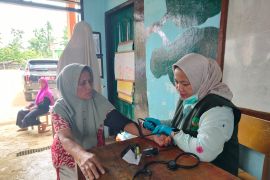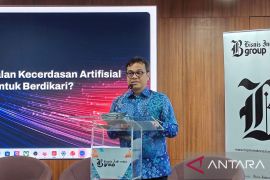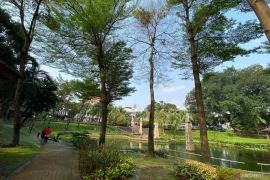"More than 4000 workers will be absorbed in the construction of a high-speed rail project connecting Jakarta and Bandung," Hanggoro said on Thursday.
KCIC is committed to empowering local citizens to work in the development of the project.
"We will coordinate with cooperatives to provide food and shelter. Experts and supervisors will come from outside," Hanggoro remarked.
Therefore, he appealed to villages' heads to provide data on local residents seeking employment with the project.
"We request that data should specify the skills or ability of local citizens. We will train those who do not have the required skills," he said.
On the occasion, village heads and community representatives around the project listened to the presentation and explanation of the plan of the project.
"Village heads and community representatives expressed their aspirations, while we explained the program. As a result, all programs will be able to involve all stakeholders, such as communities," he said.
Earlier, National Development Planning Minister Sofyan Djalil had defended the Jakarta-Bandung high-speed railway project on Friday, urging those questioning the mega-project to consider the issue from the viewpoint of Indonesia's future needs.
"We must see this project in the context of the nations future vision. Please do not see it from a short-term perspective. We can imagine that Java will become an island-city within 30 to 50 from now. We must see this project from that perspective," he told newsmen here.
Sofyan, who is also the head of the National Development Planning Agency, said he was aware of the fact that many people had questioned the need to construct this US$5.5 billion railway project because a toll road already connects Jakarta to Bandung. "Many others debate the safety of the high-speed train, but we need this train not only for the Jakarta-Bandung route but also for the Jakarta-Surabaya route," he said.
Sofyan also argued that Java would transform into an "island-city" in the future, and Indonesia would need two or three high-speed trains.
"Therefore, if we do not build such an infrastructure today, when are we going to do so?" he said, adding that the Environment Impact Analysis (Amdal) was needed for this 142.3 kilometer railway project.
The construction of this mega-project has been underway after President Joko Widodo officially launched it with a ground-breaking ceremony on January 21. Later, it triggered a public debate about the pros and cons of the project.
Certain parties alleged that this high speed railway project was being backed by a government guarantee even though the Indonesian government, from the beginning, has been asserting that it will not provide any state budget guarantee for the venture.
State Enterprises Minister Rini Soemarno told journalists on Monday that all procedures have been followed transparently and that the project is being undertaken as per a business-to-business formula.
"I am sad to see some people always talking about the high-speed train without backing their allegations with clear facts and data," she said.(*)
Editor: Heru Purwanto
Copyright © ANTARA 2016











